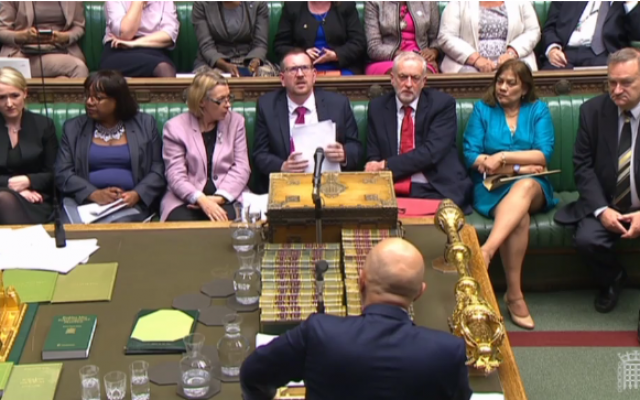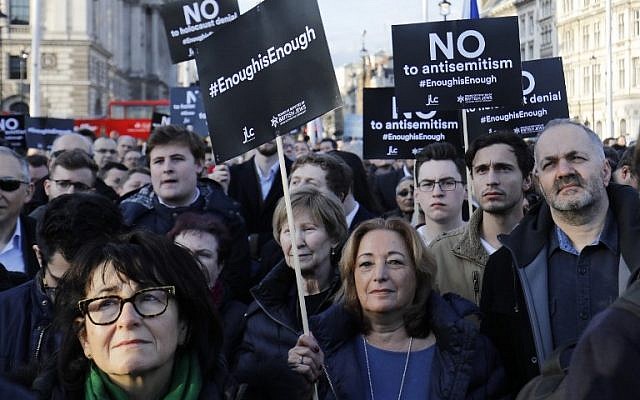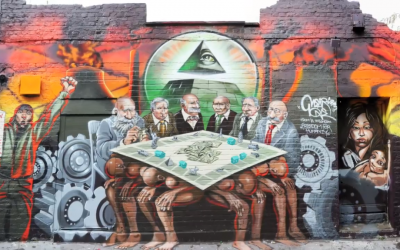Following Jewish community protests, lawmakers rail against their own party, accusing leadership of failing to tackle anti-Semitism within its ranks

British Labour lawmakers, along with several other MPs, lambasted their own party Tuesday for failing to tackle anti-Semitism within its ranks, in a heated parliament debate attended by leader Jeremy Corbyn.
The three-hour session had been called by the Conservative Party following protests by British Jews against Labour’s handling of anti-Semtisim accusations, but was replete with furious speeches from Labour MPs warning that the problem was worse than perceived.
Many of the speakers echoed banners held by members of the Jewish community at the rally, repeating the phrase “Enough is Enough” in their speeches before parliament.
Luciana Berger, the Jewish Labour MP who first demanded that Corbyn explain his defense of an anti-Semitic mural which sparked the protest last month, delivered an impassioned speech describing abuse she had personally received.
“People have accused me of having two masters, they have said I am ‘Tel Aviv’s servant,’ they have called me a paid up Israeli operative, essentially antisemitism of the worst kind suggesting I am a traitor to this country,” she said of messages she had been sent since questioning Corbyn.
Berger said she would “make no apology for holding my party to higher standards,” saying that “even one antisemitic member of the Labour party is one member too many” and should not be tolerated by the leadership.
“Anti-racism is one our essential values and there was a time not long ago when the left actively confronted antisemitism,” Berger said. “It pains me to say this in 2018 that within the Labour party antisemitism is now more commonplace, is more conspicuous and is more corrosive.”
Corbyn left the chamber after Berger’s speech, which received a standing ovation from most of the MPs present at the debate.
Fellow Jewish Labour MP Ruth Smeeth also said she had “been the target of a campaign of abuse, attempted bullying and intimidation from people who would dare to tell me that people like me have no place in the party I have been a member of for over 20 years.”
She slammed the “poison” of antisemitism that said was “engulfing” her own party, but vowed not to give up the fight or her own affiliation.
“Last month we heard a plea – enough is enough. I stand here to say we will not be bullied out of political engagement, we are going nowhere and we stand and will keep fighting until the evils of antisemitism have been removed from our society,” Smeeth said.
Labour’s Shadow Communities Secretary Andrew Gwynne responded to the speakers, admitting that the party “needed to be better” at tackling antisemitism but rejecting calls made by some MPs for party veteran Ken Livingstone and several other members to be ejected from its ranks.
Labour MP Ian Austin responded, shouting that Livingstone must be “booted out” immediately.
Labour suspended Livingstone in April 2016 after he claimed that Adolf Hitler was initially a supporter of Zionism “before he went mad and ended up killing 6 million Jews.” Earlier this month, the party extended his 2-year suspension pending the results of an internal investigation.
Lawmakers from other parties also laid into Labour, with Conservative Communities Secretary Sajid Javid accusing Corbyn of a “deeply worrying lack of leadership and moral clarity” on the issue. Scottish National Party’s Stewart MacDonald said it was “unacceptable to hold Jewish constituents responsible for the Israeli government,” an accusation some have suggested has been spurred by Corbyn, a longtime critic of Israeli actions against the Palestinians.
Allegations of Labour anti-Semitism have grown since Corbyn, a pro-Palestinian socialist, was elected leader of Britain’s main opposition party in 2015.
During the March 26 protest, around 1,500 protesters massed outside the British parliament in an unprecedented rally organized by the usually publicity-averse Anglo-Jewish leadership.

Calling for the protest, an open letter from the Board of Deputies of British Jews, Anglo-Jewry’s main representative organization, and the Jewish Leadership Council accused Corbyn of siding with anti-Semites “again and again.”

The letter said the Labour leader was “repeatedly found alongside people with blatantly anti-Semitic views,” but “claims never to hear or read them.”
The protest has been triggered by a Facebook comment from 2012 that recently came to light.
Corbyn had offered support to a street artist whose mural in east London depicted a group of businessmen and bankers, some of them Jewish, counting money around a Monopoly-style board balanced on the backs of men with dark complexions. The mural has since been taken down. Corbyn has since said he was wrong to support the painter’s “artistic freedom” without looking more closely at the image.
In a statement issued on the day of the protest, Corbyn pledged to be “a militant opponent of anti-Semitism,” telling the Jewish community: “In this fight, I am your ally and always will be.”
As reported by The Times of Israel
